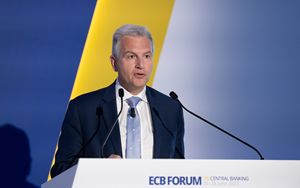(Finance) – Don’t prematurely celebrate the victory over inflation in Europe. There are many historical precedents in the world that indicate how too much haste then forced central banks to backtrack. The signal to the ECB and also to the governments of the Old Continent comes from International Monetary Fund with a reasoned contribution by Alfred Kammer, head of the Europe department of the Washington institution. “As we show in a recent article examining 100 episodes of inflation around the world – he explains Kammer in an article published on the IMF blog – history is littered with examples of premature celebrations of victory in disinflationary struggles with inflation returning time after time. This is a costly mistake that Europe can and must avoid. Price stability must be restored established at the first attempt. And as the effects of more restrictive monetary policies begin to be felt across Europe, and as criticism inevitably increases, central banks must not blink an eye.” “According to Kammer, politicians can and should also help by reducing still high deficits to rebuild or preserve fiscal reserves, which will help reduce inflation more rapidly.”
According to the Fund’s analysis, there are still some unknowns linked above all to the behavior of the social partners in Europe. “In our projections – he explains Kammer – we expect inflation to return to the target level in 2025. Before then, nominal wage growth will pick up, recovering some of the real income lost from work. With tight policies weakening domestic demand, corporate profit margins should compress and help mitigate the impact of faster wage growth on inflation, as we explain in recent research. There are, of course, risks associated with our central scenario. Wage growth could exceed our assumption, driving up labor costs. Profit margins could remain high. And, as the recent spike in oil prices is evident, commodity price shocks continue to be of concern. On the other hand, if interest rate increases feed through faster than we expect, or more strongly, to demand and inflation expectations, inflation could decline more quickly. Monetary policy should remain data-dependent. Below baseline, this means it should stay the course and remain restrictive in most countries. If inflation gets much lower or higher, rates should adjust. But, in general, during a disinflation effort – Kammer points out – it is better to err in doing a little more than in doing less in response to an upward surprise. Sooner or later the time for interest rate cuts will come. When doing so, such cuts had better not lead to reversals. That time is not now. Urgency also requires patience. The good news, meanwhile, is that European labor markets are strong. They have been through the travails of the pandemic, the energy shock and the toughest monetary policy in recent memory. European labor markets have proven remarkably resilient. With tighter monetary policy now intentionally fueling a severe credit crunch, and with the industry still adjusting to rising energy costs relative to the levels of a few years ago, some weakening of activity is inevitable, although – concludes Kammer – the slowdown will be partially mitigated by the stability of private consumption with the recovery of real wages”.
